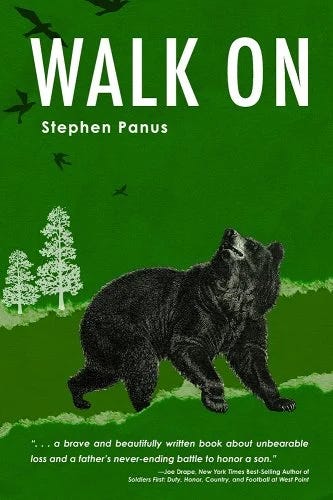Walk On for Jake
I first met Jake, however briefly, in the infield of Pimlico during the Preakness. He was all dressed up and there with his father, my friend Stephen, who had invited me to a very swanky party where a few celebrities were in attendance. That’s what Stephen did. He brought people together, made introductions, got people excited about this thing or that thing. He got conversations going, and he was good at it. He had invited me to events like this one in the past, across the country and across the Atlantic Ocean, and had introduced me to celebrities, journalists, business leaders, scholars, athletes, and all manner of interesting people. But on this day he was introducing me to his son Jake. He must have been about 15 years old. Stephen went on and on about Jake, bragging on him, honestly probably embarrassing him a little. He showed me a photo of Jake with some major celebrity. It was a sweet moment.
Today is the day that Stephen’s book “Walk On” comes out. Ordinarily “pub day” is a big day for an author, particularly a debut author like Stephen. This one is more complicated. There’s this line early in “Walk On” where Stephen describes another sweet moment between him and Jake, one that took place about a year after I met him in the Pimlico infield, where the family gathered on their porch to say goodbye to Jake as he left for a weekend away with his girlfriend’s family. As they all hugged, Jake said “You’re acting like you’ll never see me again.” It’s a line probably uttered by every teenager to their parents at some point. It’s something kids do to reassure their anxious parents that everything is fine, they’re not little kids anymore, we don’t need to worry so much. But it was in fact the last time Stephen and his family would see Jake. Two days later he died in a car accident.
“Walk On” is a book about grief, which Stephen admits is not a subject people like to talk about. And in particular, parents do not want to think about losing a child. It is, without exception, every parents deepest, darkest nightmare. I’ll admit that when he first passed me an advanced copy of the book to read, I was petrified to read it. I can’t even watch movies or TV shows anymore that involve children getting hurt, let alone dying. But I’m glad I read it. And once I started it, I couldn’t put it down. It was a captivating tale.
“Walk On” is about how people build themselves back after being destroyed by grief. It’s about the power of the bonds of family in times of crisis. It’s also about community, and how people come together to help those in need. One of the things that really struck me about “Walk On” was how in particular other people who had experienced a similar loss, who had buried their own child (or children), felt this strong compulsion to reach out to Stephen and his family, even if they were complete strangers, because they just had to. They knew what Stephen was going through. They knew what he needed. And honestly, they probably knew they needed it to.
I know people in my own family who have had to deal with this same experience. I’m sure there are plenty of other people who subscribe to my newsletter who have been touched by similar loss and grief. I am sending this because I know they will benefit from reading Stephen’s book. They may need it. And he may need them.



